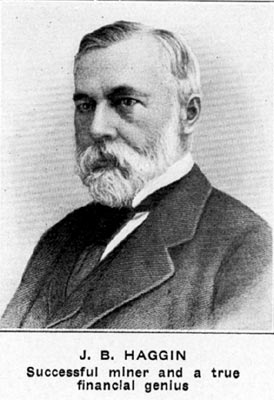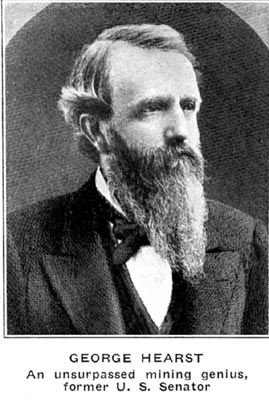| Home -> James H. Barry Press -> The Great Diamond Hoax - Chapter XX | |||
|
Chapter XX.
Burning of Harpending Block Provides Fine Spectacle, But Oversight of Owner Costs Him Dearly. George Hearst Makes Stake on Comstock and Celebrates by Taking Joe Clark on a Trip to Europe. I was busy with other things besides real estate investments, financing railroads, and politics, during the five years between 1865 and 1870. In 1869 I built the first fine business block on the south side of Market street, the Harpending Block, between First and Second streets. It was also in 1869-1870 that Ralston and myself built the Grand Hotel, partly on our own land, partly on land belonging to the Platt estate, which we held under 20 years' lease. The Harpending Block cost nearly $400,000. It was burned two years later, contributing the biggest fire in San Francisco since the '50's. Through an oversight of my agent, the insurance hardly, represented a tenth of the loss. The Grand Hotel remained for several years the last word in the hotel business of the Pacific Coast. It was its phenomenal success from the outset that induced Ralston later to embark in the Palace Hotel project, which contributed in a large measure to his ruin. I owned a three-fourths interest in the Grand Hotel; Ralston owned the balance. No one who has ever had much to do with mining can keep out of that fascinating business very long. When I returned to San Francisco from Havilah, it was my solemn intention to abandon mining forever thereafter and confine my efforts to what was known as "legitimate business," whatever that may be; I have never found out. But I hadn't more than barely got my bearings before I began to make casual incursions in a sly way into the old field of endeavor, and thus had a personal and financial acquaintance with, I think, all of the heroic figures who created the vast deep-mining industry of the far West. Only one of these big men has lasted down to our own time. J. B. Haggin[1] still lives at his home in Lexington, Ky., at a great age - 90 or more - and until recently in the enjoyment of good health. A story used to be current in San Francisco that in the early pioneer days Haggin was a devotee of play at the El Dorado and Union. One night, so the narrative runs, after successive losses he borrowed $100, to win or take the gambler's last alternative. But he had no occasion for the latter. He stood calm and imperturbable as the hundred became a thousand, and then tens of thousands, while a circle of mute, white-faced gamblers stood fascinated at his luck, until the proprietor, in a voice that showed no tremor, quietly announced the bank closed for the night. The story goes on to say that Mr. Haggin never touched a card from that day forth. All of this I have only on hearsay. Mr. Haggin lives to tell whether it is true or false. But if he abandoned gambling in one direction, he took it up in another. In the mining industry he was a plunger, par, excellence. I do not mean that he invested recklessly or without mature investigation, but when he once made up his mind, a few millions, more or less, never moved him from his purpose. The broad, liberal way he played the game had more to do with the development of the West than perhaps anything else. Haggin had nothing in common with good fellowship. He was always silent, sober and cold. But under it all he must have had a heart. He was the only one I ever knew who remembered the men who helped to give him wealth. Every man, without exception, who rendered Haggin faithful, efficient service, he made rich. And he was very loyal to his friends. In these days - and other days - when men of power exhaust the energies of their subordinates and then toss them without concern on the scrap pile, like so many sucked-out oranges, and treat their business associates just a shade better, an example such as Haggin gave ought not to be overlooked. George Hearst was probably the greatest natural miner who ever had a chance to bring his talents into play on a large scale. He was not a geologist, had no special education to start with, was not overburdened with book learning, but he had a congenital instinct for mining, just as some other people have for mathematics, music or chess. He was not a man of showy parts, liked the company of a lot of cronies, to whom he was kind and serviceable - when he wasn't broke himself - was much inclined to take the world easy, but if anyone mentioned mines in his presence, it had the same effect as saying, "Rats!" to a terrier. Hearst became alert and on dress parade in a moment. Hearst made his first big stake on the Comstock Lode, a year after it was uncovered in 1858. He was associated with his cousin, Joe Clark, and William M. Lent. I do not know the exact size of the clean-up, but it must have reached into seven figures. Such an event, in the old days was always made memorable by some kind of a "jamboree." Now, Joe Clark was a southwestern man, hailing from a section not far from where I originated myself. All of us were inclined to be provincial. For instance, Joe Clark believed that St. Louis was not only the most magnificent but the largest city in the world. He had many heated discussions on the subject and several times backed his opinions with coin; He declared that the Rue de Rivoli was a pale shadow alongside of the glories of Laclede avenue. He swore that St. Louis was bigger than London, more cultured than Athens during the age of Pericles and grander and more picturesque than Babylon, when the hanging gardens were in full bloom. It is said that Hearst suggested a "blow out" in Europe after their clean-up, in order to disabuse his kinsman's mind of certain illusions respecting St. Louis. At any rate, the two husky young miners set their faces eastward to look over the effete monarchies of the Old World. While they were pleasure bound, "Bill" Lent stayed behind to look after the investments. He sunk a shaft which headed dead on for the big bonanza and had he continued the work a little further, Flood, O'Brien; Mackay and Fair would have cut a very small figure in history. But he engaged unfortunately in a seductive looking speculation and went to pieces in a grand pyrotechnic and spectacular failure. Hearst and Clark were hopelessly involved. They received the news while they were making the tour of Europe with much eclat. Fortunately they had money enough to reach home. But the main object of the journey was accomplished. When Joe Clark mentioned St. Louis thereafter, it was the voice of a chastened soul that spoke. Of course, nothing could keep Hearst down in a mining region; Any capitalist was only too eager to back a man with such surpassing talents; but he had to pay an awful toll. For years Hearst's projects were financed at 2 1/2 per cent. per, month compounded monthly, and any business that can stand that strain and come out ahead must have a solid foundation to build on. He was the real founder not only of his own but of the vast Haggin and Tevis fortunes. I had mining deals of more or less importance with Haggin, Hearst, Hayward, Hobart, Grayson, in fact, with nearly all the large operators of those times. My largest speculations, however, were with Ralston as a silent partner, which, on average, showed more profit than loss. It was for the purpose of joint investment that late in the fall of 1870 I visited the Emma mine near Salt Lake City, which a year later was the central point of a great international scandal and will play an important part in this narrative. |
|||
 J. B. Haggin Successful miner and a true financial genius. |
|||
 George Hearst An unsurpassed mining genius, former U. S. Senator. |
|||